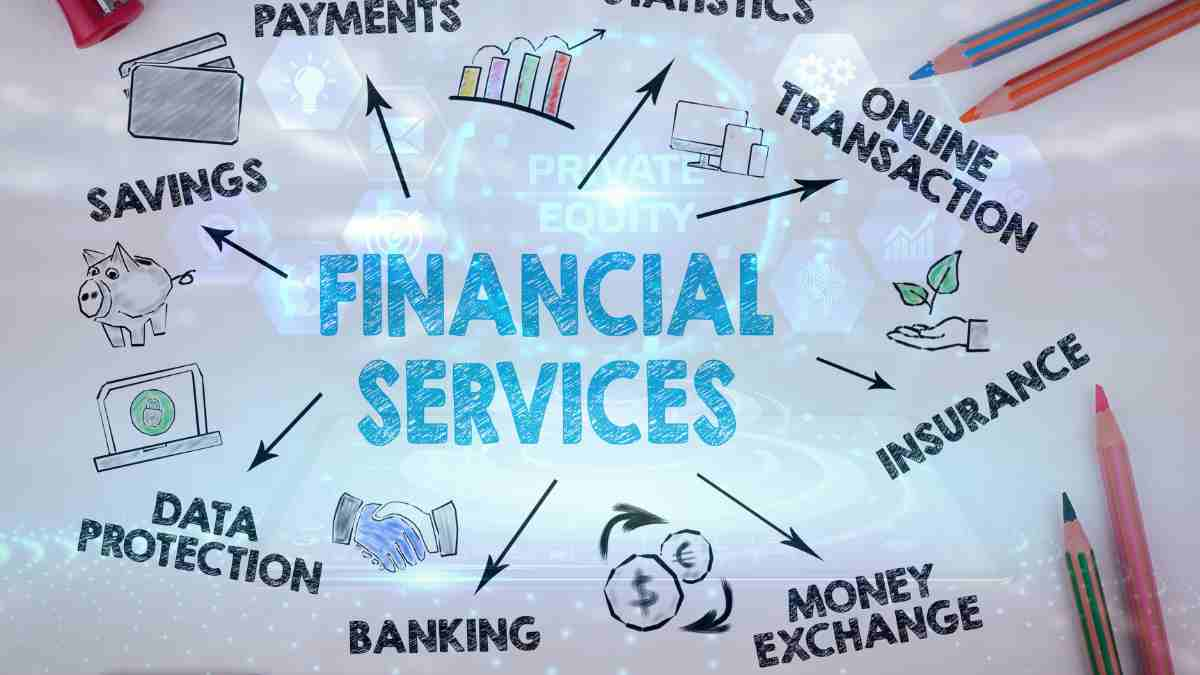Finance
Financial Services Private Equity: Tips for Investment and Maximizing Returns

Are you looking to make your money work harder for you? Interested in tapping into the lucrative world of financial services private equity? Look no further! In this blog post, we’ll guide you through the ins and outs of investing in financial services private equity, providing valuable insider tips along the way. Whether you’re a seasoned investor or just starting out, this is your ticket to unlocking immense potential returns.
Private equity investing within the financial services industry offers a unique opportunity to capitalize on the growth and profitability of companies operating in sectors such as banking, insurance, asset management, fintech, and more. With its potential for high returns and long-term success stories, it’s no wonder that many savvy investors are turning their attention towards this exciting investment avenue.
But before diving headfirst into the world of financial services private equity, it’s crucial to have a solid understanding of what it entails. So let’s start by unraveling the mysteries surrounding private equity investments within the realm of finance. Ready? Let’s go!
Understanding Private Equity in the Financial Services Industry
Private equity, in the context of the financial services industry, refers to investments made in privately-held companies within sectors such as banking, insurance, asset management, and fintech. Unlike public stocks that are traded on exchanges like the NYSE or NASDAQ, private equity involves buying shares directly from these non-publicly traded companies.
One key characteristic of private equity is its long-term investment horizon. Investors typically commit their capital for several years and aim to generate returns through various strategies like operational improvements and growth initiatives. This patient approach allows private equity firms to have a more hands-on involvement in the management and strategic decisions of their portfolio companies.
Financial services private equity offers unique advantages compared to other industries. Financial institutions often operate with stable cash flows and possess valuable intangible assets such as customer relationships and regulatory licenses. These factors can enhance the potential return on investment for private equity investors.
However, it’s important to recognize that investing in financial services private equity also comes with certain risks. The industry is subject to changing regulations, market volatility, technological disruptions, and economic downturns – all of which can impact portfolio performance. It requires careful due diligence and risk assessment before committing funds.
Though, understanding how private equity operates within the financial services sector provides investors with a powerful tool for diversifying their portfolios while aiming for attractive returns over time. By harnessing this knowledge effectively, you can position yourself strategically in an ever-evolving marketplace where opportunities abound.
Types of Financial Services Private Equity Firms
When it comes to investing in financial services private equity, it’s important to understand the different types of firms that operate in this space. Each type has its own unique characteristics and investment strategies.
First, there are traditional private equity firms that focus solely on financial services. These firms specialize in investing capital into companies within the industry, either through minority or majority ownership stakes. They typically work closely with management teams to help drive growth and increase value.
Another type is venture capital (VC) firms that specifically target early-stage financial technology (fintech) startups. These firms provide funding to innovative companies that aim to disrupt traditional financial services through technology-driven solutions. VC firms often take a more hands-on approach and offer mentorship along with their investment.
In addition, there are also mezzanine finance providers who offer debt financing solutions tailored for the financial services sector. Mezzanine financing sits between senior debt and equity investments, providing capital with higher interest rates and potential equity upside.
Furthermore, some private equity firms specialize in distressed investments within the financial services industry. These firms seek out struggling companies or assets at discounted prices with the goal of turning them around for a profit.
We have captive private equity arms of large banks or insurance companies. These entities invest directly from their balance sheets into various areas of the financial services sector based on their strategic objectives.
Understanding these different types of financial services private equity firms can help investors make informed decisions when choosing where to allocate their funds. It’s essential to align your investment goals with a firm’s expertise and track record within your desired niche area for maximum returns potential.
Benefits and Risks of Investing in Financial Services Private Equity
Investing in financial services private equity can offer a range of benefits and opportunities, but it is important to be aware of the potential risks involved. One of the main advantages of investing in this sector is the potential for high returns. Financial services companies often experience rapid growth and profitability, which can translate into significant gains for investors.
Additionally, investing in financial services private equity allows individuals to diversify their investment portfolio. By allocating funds to this asset class, investors can reduce risk by spreading their capital across different industries and sectors.
Another benefit is the opportunity to gain exposure to innovative and disruptive technologies within the financial services industry. Private equity firms often invest in fintech companies that are at the forefront of technological advancements, providing investors with access to potentially lucrative opportunities.
Despite these benefits, there are also risks associated with investing in financial services private equity. One key risk is the illiquid nature of these investments. Unlike publicly traded stocks or bonds that can be easily bought or sold on an exchange, private equity investments typically have a longer holding period before they can be liquidated.
Furthermore, due diligence becomes crucial when considering investment options within this sector. Investors must thoroughly research and evaluate potential targets before committing capital as there may be inherent risks associated with certain businesses or strategies employed by private equity firms.
In conclusion¸ investing in financial services private equity offers both rewards and challenges. It provides an avenue for potentially high returns and diversification while also carrying risks such as illiquidity and careful due diligence requirements(removed). To make informed decisions about whether this type of investment aligns with your goals and risk tolerance level requires thorough analysis(removed)
Successful Examples of Financial Services Private Equity Investments
Tech Startup Funding
One notable example of a successful financial services private equity investment is the funding provided to a tech startup that revolutionized the mobile payment industry. This investment allowed the company to expand its operations, develop new products, and ultimately achieve significant growth in market share.
Real Estate Development:
Another success story involves an investment in a real estate development project. The private equity firm identified an opportunity in an up-and-coming neighborhood and provided capital for the construction of luxury residential properties. As demand soared, these properties quickly sold out at premium prices, resulting in substantial returns for the investors.
Healthcare Sector Expansion:
A financial services private equity firm recognized the potential for growth in the healthcare sector and invested in a medical technology company specializing in telemedicine solutions. With their expertise and strategic guidance, this company was able to scale its operations rapidly and capture a larger portion of the market.
Infrastructure Projects
Infrastructure investments have also proven fruitful for financial services private equity firms. For instance, one such firm invested heavily in renewable energy projects such as solar farms and wind power facilities. As governments worldwide prioritized sustainable energy sources, these investments generated impressive returns while contributing to environmental sustainability.
Entertainment Industry Ventures
An innovative film production studio received funding from a financial services private equity firm that recognized its potential blockbuster films’ commercial appeal before they were even released! This foresight paid off handsomely as those movies went on to become box office hits, earning massive profits not only from ticket sales but also through licensing deals and merchandise sales.
These examples demonstrate how astute investments by financial services private equity firms can lead to significant successes across various industries
Factors to Consider Before Investing in Financial Services Private Equity
When considering investing in financial services private equity, it’s crucial to carefully assess various factors. Here are some key considerations to keep in mind:
- Risk Tolerance: Private equity investments can be highly risky and illiquid. Assess your risk tolerance before committing funds to this type of investment.
- Investment Horizon: Private equity is a long-term investment strategy that often requires capital locked up for several years. Ensure you have the necessary time horizon before investing.
- Expertise and Due Diligence: Thoroughly research potential firms or funds before making a decision. Evaluate their track record, expertise in the financial services sector, and their investment strategies.
- Diversification: Consider how private equity fits into your overall investment portfolio and ensure proper diversification across different asset classes.
- Exit Strategy: Understand the firm’s exit strategy for their investments, as this will impact the timing and return on your own investment.
- Fees and Expenses: Familiarize yourself with all fees associated with investing in private equity, including management fees, carried interest, and other expenses which may affect returns.
- Reliability of Cash Flows: Analyze the stability of cash flows from underlying investments within the fund or firm you are considering investing in.
- Regulatory Environment: Consider any regulatory changes or developments that may impact both individual companies within the sector as well as private equity as a whole.
By carefully evaluating these factors alongside personal goals and circumstances, investors can make informed decisions when it comes to financial services private equity opportunities
Strategies for Maximizing Returns in Financial Services Private Equity
When it comes to investing in financial services private equity, maximizing returns is the name of the game. And while every investment strategy carries its own unique set of risks and rewards, there are a few key strategies that can help investors increase their chances of achieving higher returns.
One strategy is to focus on industry expertise. By targeting firms or funds that have a deep understanding and experience within the financial services sector, investors can benefit from their specialized knowledge and network. This allows for better decision-making when it comes to identifying potential investment opportunities and managing risks.
Another important strategy is diversification. Investing in a wide range of financial services companies helps spread risk across different sectors, geographies, and market conditions. This not only reduces exposure to any single company’s performance but also increases the likelihood of capturing growth opportunities in various segments of the industry.
Timing is another critical factor in maximizing returns. Identifying trends or upcoming developments within the financial services industry can provide valuable insights into where future growth may occur. By being proactive and taking advantage of these opportunities before they become mainstream, investors can potentially generate substantial returns.
Additionally, active management plays a significant role in maximizing returns in financial services private equity investments. Regularly monitoring portfolio performance, actively engaging with portfolio companies, and making strategic adjustments as needed can help optimize investment outcomes.
Leveraging technology and data analytics has become increasingly crucial for success in today’s digital age. Technology-driven solutions such as AI-powered algorithms or machine learning models enable more accurate analysis of market trends and valuation metrics – providing valuable information for informed decision-making.
In conclusion, implementing these strategies doesn’t guarantee success but may enhance an investor’s chances of generating higher returns when investing in financial services private equity.
The Future of Financial Services Private Equity
The future of financial services private equity looks promising, as the industry continues to evolve and adapt to changing market dynamics. With technological advancements and digital transformation becoming increasingly important in the financial sector, private equity firms are strategically investing in innovative companies that offer disruptive solutions.
One key trend shaping the future of financial services private equity is the rise of fintech. As technology continues to revolutionize the way we conduct financial transactions, there is a growing demand for investment in fintech startups. These companies leverage cutting-edge technologies such as artificial intelligence, blockchain, and machine learning to provide efficient and customer-centric financial services.
Another area of opportunity lies in sustainable finance. Environmental, social, and governance (ESG) considerations have gained significant traction in recent years. Private equity firms are recognizing the importance of investing in companies that align with ESG principles. This not only helps improve their environmental footprint but also mitigates risks associated with climate change and societal issues.
Additionally, emerging markets present exciting prospects for financial services private equity investors. As economies grow and become more interconnected globally, there is an increased need for access to capital and sophisticated financial solutions. Investing in these markets can provide attractive returns while supporting economic development.
Furthermore, regulatory changes will continue to shape the landscape for financial services private equity investments. Increased scrutiny from regulators may impact deal structures or require additional due diligence processes. Staying abreast of regulatory developments will be crucial for successful investments.
In conclusion, the future of financial services private equity holds immense potential driven by trends such as fintech innovation, sustainable finance focus, and opportunities arising from emerging markets.Moreover, adapting to evolving regulations will be essential to navigate challenges effectively. By staying ahead of industry developments and making strategic investments, investors can position themselves for long-term success in this dynamic sector.
Exciting times lie ahead!
Case Studies: Successful Investments in Financial Services Private Equity
- Acme Capital’s Investment in Fintech Start-up X:
Acme Capital, a renowned financial services private equity firm, made a strategic investment in X, a promising fintech start-up. With its innovative technology and disruptive business model, X quickly gained traction in the market. Under the guidance of Acme Capital, X successfully expanded its customer base and launched new product offerings.
- Venture Partners’ Investment in Wealth Management Firm Y:
Venture Partners recognized the potential of Y, a wealth management firm that leveraged cutting-edge technology to provide personalized investment solutions. Through their investment and expertise, Venture Partners helped Y enhance its digital platform and improve operational efficiency. As a result, Y experienced significant growth and attracted high-net-worth clients.
- Growth Fund’s Investment in Insurance Company Z:
Growth Fund identified Z as an insurance company with untapped potential for expansion into emerging markets. By infusing capital and industry knowledge, Growth Fund supported Z’s international growth strategy and facilitated partnerships with local insurers abroad. This strategic move enabled Z to capture new market opportunities while diversifying its revenue streams.
- Alpha Investors’ Investment in Payment Processing Company W:
Alpha Investors recognized the increasing demand for secure payment processing solutions globally and invested heavily in W – a leading player in this space. Through active collaboration with Alpha Investors’ network of experts, W developed innovative payment technologies that revolutionized the industry landscape while achieving remarkable revenue growth year after year.
These case studies demonstrate how successful investments can be made by identifying promising companies within the financial services sector through thorough due diligence processes conducted by reputable private equity firms or funds.
Conclusion
When it comes to investing, there are countless options available. One avenue that has gained significant attention in recent years is financial services private_equity. But is this investment option truly viable?
Financial services private equity can offer attractive returns for investors who understand the risks involved and have a long-term perspective. The industry offers a wide range of opportunities, from traditional banks and insurance companies to fintech startups and payment processors.
However, like any investment, financial services private equity carries its fair share of risks. Market volatility, regulatory changes, and economic downturns can all impact the performance of these investments. It’s crucial for investors to carefully evaluate their risk tolerance before diving into this sector.
Choosing the right fund or firm is also key to maximizing returns in financial services private_equity. Conducting thorough due diligence on management teams, track records, and investment strategies is essential. Partnering with experienced professionals who have a deep understanding of the industry can significantly increase your chances of success.
To maximize returns in financial services private_equity investments , diversification is important . Allocating capital across different sectors within the industry helps mitigate risk while capturing upside potential
Successful case studies provide valuable insights into the potential rewards that come with investing in financial services private_equity . Whether it’s backing a disruptive fintech company or acquiring an undervalued regional bank , smart investments have yielded substantial profits for savvy investors .
Challenges will inevitably arise along the way when navigating through the world of financial services private_equity . Adapting to changing market conditions , managing regulatory compliance hurdles , and addressing operational issues are all part of the game . However , those willing to embrace these challenges can reap significant rewards .
In conclusion , Financial Services Privat_ Equity presents itself as a compelling option for investors seeking higher returns Although it does carry inherent risks by considering various factors such as risk tolerance choosing wisely among funds implementing effective strategies learning from successful examples navigating challenges effectively one can position themselves favorably in this sector . Ultimately , the decision comes down to individual circumstances and preferences
FAQs
What is financial services private_equity?
Banking and financial The term “private_equity” describes investments in businesses and organizations that provide financial services, such as banks, insurance agencies, asset management companies, and others. Private equity firms put money into these companies so they may buy shares, help them develop, or reorganize their operations so they make more money.
How does financial services private_equity differ from other forms of investment?
Direct investments in private financial services firms are the focus of financial services private_equity, as opposed to more conventional public market investments. Aiming for development and wealth creation in the long run, this frequently gives investors a bigger say in the management and strategy of the companies in which they have invested.
What are the typical investment strategies in financial services private equity?
Financial services private_equity investment strategies might differ. Some common methods include investing in breakthrough fintech startups, reorganizing underperforming organizations, purchasing controlling interests in financial institutions, or funding financial sector expansions and mergers.
What are the potential risks associated with financial_services_private _equity investments?
Perils of the banking sector problems inside invested firms, changes in regulations influencing the financial industry, economic downturns affecting the sector, and difficulty in exiting investments owing to market circumstances are all potential obstacles in private equity. Interest rate fluctuations, credit market fluctuations, and technology disruptions are other potential hazards.
Who typically invests in financial services_private_equity?
Potential backers of financial services Institutional investors like pension funds, endowments, and insurance companies are common participants in private_equity, along with wealthy individuals and family offices looking for alternative investment opportunities with greater returns. For their own financial sector endeavors, private equity companies often seek funding from these investors.
Finance
https://thetechijournal.com/onyx-shower/

In House Financing Cars! Are you dreaming of cruising around town in your dream car, but struggling to secure financing? In-house financing could be the solution you’ve been searching for! From understanding how it works to navigating the negotiation process, this blog will guide you through everything you need to know before buying a car with in-house financing. Buckle up and let’s dive into the world of in-house car financing together!
In House Financing Cars: Explanation of In House Financing
In house financing cars is a financing option offered directly by car dealerships, allowing customers to secure a loan without going through a third-party lender. This type of financing can be appealing to those with less-than-perfect credit or limited financial history.
So, what does in-house financing cars mean at car dealerships? Essentially, it means that the dealership acts as the lender, providing you with the funds needed to purchase your vehicle directly.
How does in-house car financing work? Well, instead of applying for a loan from a bank or credit union, you’ll submit your application and financial information directly to the dealership. The dealership will then review your application and determine the terms of your loan based on their own criteria.
Not all car lots offer in-house financing, so it’s essential to do some research and find dealerships that provide this option if you’re interested. Keep in mind that each dealership may have different requirements and terms for their in-house financing options.
What is in House Financing for Cars
In house financing for cars is when the dealership provides the loan directly to the buyer, cutting out the need for a third-party financial institution. This option can be appealing to those who may have difficulty obtaining traditional financing due to credit issues or lack of credit history. With in house financing, dealerships make their own lending decisions based on factors such as income and employment stability.
By offering in house financing, car dealerships aim to attract a wider range of customers and increase sales by providing more accessible options for purchasing a vehicle. This type of financing can streamline the buying process and offer convenience for buyers who prefer dealing directly with the dealership for their loan needs.
Understanding what in house financing entails is essential before considering this option when purchasing a car. It’s important to weigh the pros and cons carefully to determine if it’s the right choice for your unique financial situation.
What Does in House Financing Mean at Car Dealerships
In the world of car shopping, in-house financing at dealerships can be a game-changer. But what exactly does it mean? Well, when a dealership offers in-house financing, it means they are willing to finance your car purchase themselves instead of going through a third-party lender.
This can be beneficial for those who may not qualify for traditional bank loans due to credit challenges or other financial reasons. In-house financing allows the dealership to work directly with customers to find a payment plan that fits their budget and needs.
Essentially, it’s like one-stop shopping – you pick out your dream car and secure financing all under one roof. It gives buyers more flexibility and convenience in the purchasing process. Plus, dealerships offering in-house financing often have more lenient approval criteria compared to banks or credit unions.
How Does In House Financing Cars Work
When it comes to in house car financing, the process is pretty straightforward. Instead of going through a third-party lender like a bank or credit union, the dealership itself provides the financing for your vehicle purchase. This means you’ll work directly with the dealership’s finance department to secure a loan and make payments.
Typically, you’ll need to fill out an application detailing your financial information and credit history. The dealership will then review your application and determine what loan terms they can offer you based on their internal criteria. Once approved, you’ll sign a financing agreement outlining the terms of the loan, including interest rate, monthly payments, and repayment schedule.
It’s important to note that in house financing may come with higher interest rates compared to traditional lenders due to potentially increased risks for the dealership. However, it can be a convenient option for those with less-than-perfect credit or who prefer a more streamlined purchasing process at the dealership.
What Car Lots Do in House Financing
When it comes to in house financing for cars, not all car lots offer this option. Car lots that provide in house financing typically have their own finance department or work directly with financial institutions to facilitate loans for customers who may not qualify through traditional lenders.
These specialized car dealerships often cater to individuals with less than perfect credit scores or those who have limited credit history. By offering in house financing, these car lots can help a wider range of customers get behind the wheel of a vehicle they need.
Customers looking for in house financing options should seek out dealerships that explicitly advertise this service. These establishments will have knowledgeable staff who can guide buyers through the application process and explain the terms and conditions of the loan agreement.
Choosing a car lot that offers in house financing can be beneficial for those facing credit challenges or seeking a more streamlined approval process when purchasing a vehicle.
How to Qualify forIn House Financing Cars
To qualify for In House Financing Cars when buying a car, there are a few key factors to consider. First and foremost, your credit score plays a significant role in determining your eligibility for this type of financing. Dealerships offering in-house financing may be more flexible with credit scores compared to traditional lenders.
Additionally, you will need to provide proof of income to demonstrate your ability to make regular payments on the loan. This can include pay stubs or bank statements. Some dealerships may also require a down payment or trade-in vehicle as part of the qualification process.
It’s important to have a clear understanding of your budget and how much you can afford to spend on monthly payments before applying for in-house financing. Being prepared with all necessary documentation and information will help streamline the approval process and increase your chances of qualifying for this type of financing option.
Tips for Negotiating with Dealerships
When it comes to negotiating with dealerships for in-house financing cars, preparation is key. Start by researching the market value of the car you’re interested in and set a budget beforehand.
Be confident but respectful during negotiations. Remember that both parties are looking for a mutually beneficial deal. Don’t be afraid to walk away if the terms don’t meet your expectations.
If possible, try to negotiate based on the total cost of the vehicle rather than monthly payments. This can give you a clearer picture of what you’re actually paying in the long run.
Ask about any incentives or promotions that might be available to help lower the overall price. Dealerships may have special offers or discounts that could work in your favor.
Always read and understand all documents before signing anything. Make sure there are no hidden fees or clauses that could come back to bite you later on.
Advantages and Disadvantages of In House Financing Cars
When it comes to in house financing cars, there are both advantages and disadvantages to consider. One of the main advantages is that it can be easier to qualify for compared to traditional bank loans. This can be beneficial for individuals with less-than-perfect credit scores or those who may have difficulty getting approved elsewhere.
Additionally, in house financing often offers a more streamlined process, allowing you to complete your purchase quickly without having to wait for external approvals. Moreover, some dealerships may offer flexible payment terms tailored to your financial situation, making it easier to manage your payments.
On the flip side, one of the main disadvantages of in house financing is that it typically comes with higher interest rates than traditional loans. This means you could end up paying more over time compared to securing a loan through a bank or credit union.
Furthermore, some in house financing arrangements may have stricter repayment terms and consequences if you miss payments, potentially putting your vehicle at risk if you fall behind on payments. It’s essential to carefully review all terms and conditions before committing to an in house financing agreement.
Understanding Interest Rates and Payment Terms
Understanding the interest rates and payment terms when opting for in-house financing is crucial. Interest rates can greatly impact the total cost of your vehicle over time. The lower the rate, the less you’ll pay in the long run. Payment terms refer to how long you have to repay your loan and can determine your monthly payments.
Interest rates on in-house financing cars tend to be higher than traditional loans since they are often provided without thorough credit checks. This means you may end up paying more over time. Make sure you fully understand what interest rate you’re being offered and how it compares to other options available.
Payment terms typically range from 12-72 months, with longer terms resulting in lower monthly payments but higher overall costs due to accruing interest. It’s essential to weigh the pros and cons of longer versus shorter payment terms based on your financial situation.
Before committing to any deal, make sure to carefully review all details regarding interest rates and payment terms so that there are no surprises down the road. Understanding these factors will help you make an informed decision when considering in-house financing for your next car purchase.
In House Financing Cars: Potential Risks and Precautions
When consideringIn house financing cars for your next car purchase, it’s important to be aware of the potential risks and take necessary precautions. One risk is that some dealerships may charge higher interest rates compared to traditional lenders, leading to increased overall costs. Another risk is the possibility of hidden fees or undisclosed terms that could catch you off guard.
To avoid these risks, make sure to carefully review all loan documents before signing anything. Ask questions about any unclear terms or conditions and seek clarification if needed. It’s also advisable to research the dealership’s reputation and read reviews from other customers to gauge their trustworthiness.
Additionally, consider getting pre-approved for a loan from a bank or credit union before visiting dealerships offering in-house financing. This way, you can compare offers and ensure you’re getting the best deal possible while protecting yourself from potentially predatory lending practices.
Alternatives to In House Financing Cars
If you’re considering purchasing a car but want to explore alternatives to in-house financing, there are several options available. One alternative is securing a traditional auto loan from a bank or credit union. These institutions often offer competitive interest rates and flexible payment terms.
Another option is exploring lease-to-own programs, where you can lease a vehicle with the option to buy it at the end of the term. This can be beneficial for those looking for lower monthly payments or who may not qualify for a traditional loan.
You could also consider saving up and paying cash for a pre-owned vehicle. While this may require patience and discipline, it eliminates the need for financing altogether.
Some dealerships offer manufacturer incentives such as 0% APR financing on select models. Be sure to research and compare all your options before making a decision on how to finance your next car purchase.
Conclusion
As you wrap up your journey into the world of in-house financing cars, remember that knowledge is power. Understanding how in-house financing works, qualifying for it, negotiating effectively with dealerships, and being aware of the advantages and disadvantages are all crucial aspects to consider before making a decision.
Interest rates and payment terms play a significant role in determining the overall cost of your vehicle purchase through in-house financing. Being informed about these factors can help you make a more financially sound choice.
While there are risks involved with in-house financing cars, taking precautions such as thoroughly reading and understanding the terms of the agreement can help mitigate potential pitfalls.
Exploring alternative In House Financing Cars options can also provide you with more flexibility and potentially better terms suited to your financial situation.
In the end, arming yourself with knowledge and being proactive in your approach will empower you to make an informed decision when it comes to buying a car through in-house financing.
FAQs: In House Financing Cars
What credit score do I need to qualify for in-house financing?
Usually, in-house financing is more lenient than traditional bank loans, so you may still qualify with a lower credit score. However, the specific requirements can vary between dealerships.
Can I negotiate the terms of an in-house financing agreement?
Yes, negotiating is always an option when it comes to car financing. Don’t be afraid to discuss interest rates, down payments, and payment terms with the dealership.
Are there any hidden fees associated with in-house financing?
It’s essential to carefully review the contract before signing to understand all fees involved. Ask about any potential additional charges or penalties upfront.
Is in-house financing only available for new cars?
In House Financing Cars can be available for both new and used cars at some dealerships. It’s best to inquire directly with the dealer about their options.
What happens if I default on my in-house financing payments?
If you miss payments or default on your agreement, the dealership may repossess your vehicle as collateral. It’s crucial to communicate any financial difficulties early on and potentially renegotiate payment terms if needed.
Finance
Bad Credit Financing for ATV: How to Get Approved Despite Your Credit Score

Bad Credit Financing for ATV! Looking to hit the trails on a brand-new ATV but worried about your less-than-perfect credit score holding you back? Don’t let bad credit put the brakes on your off-road adventures! In this guide, we will explore how you can secure financing for an ATV even with a rocky credit history. Get ready to rev up your engines and discover how you can make your ATV dreams a reality, no matter what your credit score may be!
Bad Credit Financing for ATV: Understanding Bad Credit
When it comes to financing, your credit score plays a crucial role in determining your financial health. Bad credit typically refers to a low credit score resulting from missed payments, high debt levels, or other negative factors. Your credit score is a numeric representation of your creditworthiness and how likely you are to repay borrowed funds on time.
Lenders use this information to assess the risk of lending money to you. A lower credit score signals higher risk for lenders, making it more challenging to secure loans or favorable interest rates. Understanding the factors that contribute to bad credit can help you take steps towards improving your financial situation and increasing your chances of approval for ATV financing despite past setbacks.
It’s important to be aware of where you stand financially and take proactive measures to address any issues dragging down your credit score. By gaining insight into how bad credit impacts your ability to secure financing, you can work towards rebuilding your financial reputation and achieving your goals in the long run.
Bad Credit Financing for ATV: The Impact of Bad Credit on ATV Financing
Having bad credit can significantly impact your ability to secure financing for an ATV. Lenders use your credit score as a measure of risk, determining whether you are likely to make timely payments. With bad credit, lenders may see you as a higher risk borrower and may offer less favorable terms such as higher interest rates or larger down payments.
Additionally, having bad credit could limit the number of lenders willing to work with you, making it more challenging to find suitable financing options for your ATV purchase. Some lenders may even outright deny your application based on your credit history alone.
It’s important to understand how bad credit affects ATV financing so that you can be prepared for potential obstacles in the loan approval process. By proactively addressing any issues related to your credit score, you can improve your chances of securing financing despite past financial setbacks.
Bad Credit Financing for ATV: Options for Bad Credit Financing
If you’re in the market for an ATV but have bad credit, don’t lose hope just yet. There are options available to help you secure financing despite your credit score.
One option is seeking out lenders who specialize in bad credit financing. These lenders understand that not everyone has a perfect credit history and are willing to work with individuals to find a solution that fits their needs.
Another option is considering a co-signer for your loan. Having someone with good credit co-sign the loan can increase your chances of approval and potentially lower your interest rate.
Additionally, exploring in-house financing offered by some ATV dealerships could be beneficial. These programs may have more lenient requirements compared to traditional lenders.
Remember, it’s essential to research and compare different financing options to find the best fit for your situation.
Tips for Improving Your Chances of Approval
Looking to improve your chances of getting approved for ATV financing despite having bad credit? Here are some tips to help you increase your odds:
First, work on improving your credit score by paying off any outstanding debts and making timely payments on your existing loans. This will show lenders that you are actively trying to manage your finances responsibly.
Consider saving up for a larger down payment. A substantial down payment can demonstrate to the lender that you are committed to the purchase and can reduce the overall loan amount, making it less risky for them.
Shop around and compare offers from different lenders. Each lender has their own criteria for approval, so exploring multiple options can help you find one that is more willing to work with individuals with bad credit.
Consider getting a co-signer with good credit. Having someone co-sign the loan with you can significantly boost your chances of approval as they are essentially vouching for your ability to repay the loan.
Be prepared to negotiate terms with potential lenders. Don’t be afraid to discuss your situation openly and see if there is room for flexibility in terms such as interest rates or repayment schedules.
Factors to Consider When Choosing a Lender
When looking for a lender to finance your ATV despite having bad credit, there are several factors you should consider.
First and foremost, make sure to research different lenders and compare their terms and interest rates. Look for lenders who specialize in bad credit financing as they may be more understanding of your situation.
Consider the loan terms offered by each lender – pay attention to the repayment period, monthly payments, and any additional fees or charges that may apply.
It’s also important to check if the lender reports payment activity to credit bureaus. Timely payments on your ATV loan can help rebuild your credit over time.
Don’t forget to read reviews or ask for recommendations from others who have used similar financing options. Customer feedback can provide valuable insights into a lender’s reputation and customer service.
Choose a lender that not only offers reasonable terms but also provides excellent customer support throughout the loan process.
Alternatives to Traditional ATV Financing
If you’re looking for alternatives to traditional ATV financing options, there are a few routes you can explore. One option is seeking out specialized lenders that cater to individuals with bad credit. These lenders may be more willing to work with your specific financial situation and offer more flexible terms.
Another alternative is considering in-house financing offered by some ATV dealerships. In-house financing allows you to make payments directly to the dealership instead of a third-party lender, which can sometimes lead to more lenient approval requirements.
Additionally, exploring peer-to-peer lending platforms or online lending networks could provide alternative financing solutions for purchasing an ATV. These platforms connect borrowers with individual investors willing to fund loans at competitive rates.
If traditional financing options aren’t working for you, don’t forget about the possibility of saving up and purchasing an ATV outright. This eliminates the need for financing altogether and can help you avoid high interest rates or strict approval criteria often associated with loans.
Conclusion
As you wrap up your search for bad credit financing options for an ATV, remember that there are various avenues to explore. Whether you choose to work on improving your credit score or opt for alternative financing solutions, the key is to be proactive in finding the best fit for your financial situation.
Consider reaching out to lenders specializing in bad credit financing and compare their offers carefully before making a decision. Remember, each lender may have different criteria and requirements, so it’s essential to find one that aligns with your needs.
Don’t get discouraged if you face rejection initially; keep exploring different options until you find a solution that works for you. With determination and research, getting approved for ATV financing despite a less-than-perfect credit score is achievable.
Stay informed about the latest trends in bad credit financing and continue educating yourself on ways to improve your financial standing. By staying proactive and resourceful, you can navigate through the challenges of securing ATV financing with bad credit successfully.
FAQs: Bad Credit Financing for ATV
Can I get approved for ATV financing with bad credit?
Yes, it is possible to secure ATV financing even if you have a low credit score. There are lenders who specialize in bad credit loans and are willing to work with individuals facing financial challenges.
What can I do to improve my chances of getting approved?
To increase your likelihood of approval, consider applying for a loan with a co-signer, saving up for a larger down payment, or working on improving your credit score before applying for financing.
Are there specific lenders that cater to individuals with bad credit?
Yes, there are lenders that specifically offer bad credit financing options for ATVs. These lenders understand the challenges faced by individuals with poor credit and are more willing to work with them.
How do I choose the right lender for my situation?
When selecting a lender for your ATV financing needs, be sure to compare interest rates, terms and conditions, customer reviews, and overall reputation in the industry. Choose a lender that offers fair terms and has experience working with borrowers in similar situations.
What are some alternatives to traditional ATV financing?
If traditional ATV financing is not an option due to your bad credit history, consider alternative options such as personal loans from online lenders or specialty finance companies that cater specifically to individuals with poor credit.
Finance
Kinsmith Finance: A Comprehensive Guide to Understanding This Type of Loan

Are you in need of a financial solution that offers flexibility and convenience? Look no further than Kinsmith Finance! If you’re curious about what this type of loan entails, you’ve come to the right place. In this comprehensive guide, we’ll break down everything you need to know about Kinsmith Finance – from how it works to who is eligible and much more. Let’s dive in and explore the world of Kinsmith Finance together!
What is Kinsmith Finance?
Kinsmith Finance is a type of loan that provides individuals with the opportunity to borrow money for various purposes, such as home renovations, debt consolidation, or unexpected expenses. Unlike traditional loans from banks or credit unions, Kinsmith Finance typically offers more flexibility in terms of repayment options and eligibility criteria.
This financial product is often accessible online through lenders who specialize in providing quick and convenient funding solutions. Kinsmith Finance may also be referred to as a personal loan or an installment loan, depending on the specific terms and conditions offered by the lender.
With Kinsmith Finance, borrowers can usually receive funds quickly upon approval of their application. The amount you can borrow and the interest rates associated with Kinsmith Finance will vary based on factors such as your credit score, income level, and desired loan term.
How Does it Work?
Kinsmith Finance works by providing individuals with a convenient way to access quick funds for various financial needs. To start, applicants need to fill out an online form detailing the loan amount and repayment terms they desire.
Once the application is submitted, Kinsmith Finance reviews the information provided to determine eligibility. This process usually involves assessing the applicant’s credit score and financial history to ensure they can repay the loan.
If approved, borrowers receive their funds directly into their bank account within a short timeframe. The borrower then repays the loan according to the agreed-upon terms, including interest rates and any additional fees.
Kinsmith Finance simplifies the borrowing process by offering a user-friendly platform that allows customers to manage their loans efficiently. With transparent terms and flexible repayment options, Kinsmith Finance aims to make borrowing money hassle-free for those in need of financial assistance.
Benefits of Kinsmith Finance
Looking into the benefits of Kinsmith Finance can shed light on why this type of loan is gaining popularity among borrowers. One key advantage is the flexibility it offers in terms of loan amounts and repayment schedules. This allows borrowers to tailor their loans to meet their specific financial needs without feeling constrained by rigid terms.
Another benefit worth noting is the speed at which funds are disbursed. With Kinsmith Finance, borrowers can access funds quickly, making it an ideal option for those who require immediate financial assistance. Additionally, the application process for a Kinsmith loan is typically straightforward and hassle-free compared to traditional lending institutions.
Furthermore, Kinsmith Finance often provides competitive interest rates, helping borrowers save money over time on interest payments. The transparency of fees and charges associated with these loans also adds to their appeal, as borrowers can have a clear understanding of what they are signing up for from the start.
The benefits of Kinsmith Finance make it a viable option for individuals seeking convenient and flexible financing solutions that align with their unique financial circumstances.
Who is Eligible for a Kinsmith Loan?
Are you considering applying for a Kinsmith Finance loan? Wondering if you meet the eligibility criteria? Well, let’s break it down for you.
To qualify for a Kinsmith loan, you typically need to be at least 18 years old and have a steady source of income. Whether you’re employed or self-employed, as long as you can demonstrate your ability to repay the loan amount, you’re on the right track.
Credit history also plays a role in determining eligibility. While Kinsmith Finance may be more flexible than traditional lenders when it comes to credit scores, having a good credit history can increase your chances of approval.
Additionally, some lenders may require applicants to provide collateral or a co-signer depending on the loan amount requested. This added security helps mitigate risk for both parties involved in the lending process.
Meeting these basic requirements sets the foundation for being eligible for a Kinsmith Finance loan. If you tick these boxes and are in need of financial assistance, consider exploring this lending option further!
The Application Process
Applying for a Kinsmith Finance loan is a straightforward process that can be completed entirely online. To begin, you’ll need to visit their website and fill out an application form with your personal information, employment details, and the amount you wish to borrow.
Once you submit your application, the Kinsmith team will review it promptly and assess your eligibility based on their criteria. If approved, you will receive a loan offer outlining the terms and conditions.
If you choose to accept the offer, you can e-sign the agreement electronically. After that, the funds will be deposited directly into your bank account within a specified timeframe.
It’s essential to ensure that all information provided in your application is accurate and up-to-date to expedite the approval process. Be prepared to provide any additional documentation if requested by Kinsmith Finance during their assessment.
Repayment and Interest Rates
Repayment and interest rates are crucial aspects to consider when taking out a Kinsmith Finance loan. The repayment terms vary depending on the amount borrowed and the agreed-upon schedule. It’s essential to understand how much you’ll need to repay each month to budget accordingly.
Interest rates play a significant role in determining the overall cost of your loan. Kinsmith Finance offers competitive rates that are based on various factors such as credit history, income, and loan amount. Lower interest rates can save you money in the long run.
When planning for repayment, it’s important to factor in both the principal amount borrowed and the accrued interest. Making timely payments is key to maintaining a good credit score and avoiding any potential late fees or penalties.
Before committing to a Kinsmith Finance loan, carefully review the repayment terms and interest rates to ensure they align with your financial goals and capabilities.
Alternatives to Kinsmith Finance
When it comes to exploring alternatives to Kinsmith Finance, there are several options worth considering that may better suit your financial needs. One popular alternative is traditional bank loans, which often offer competitive interest rates and longer repayment terms. Another option is peer-to-peer lending platforms, where individuals can borrow money from investors at potentially lower rates.
Credit unions are also a viable alternative to Kinsmith Finance, as they typically offer more personalized service and flexible terms. Additionally, online lenders provide quick and convenient access to funds for those in need of a loan without the hassle of visiting a physical branch. If you have valuable assets such as real estate or stocks, you may be able to secure a loan using them as collateral through asset-based lending.
Exploring these alternatives can help you find the best financing solution that aligns with your specific financial goals and circumstances.
Conclusion
So, is Kinsmith Finance the right choice for you? It depends on your financial situation and needs. Consider the flexibility and convenience it offers compared to traditional loans. Think about how quickly you need access to funds and whether Kinsmith Finance can meet that timeline.
Reflect on your credit history and whether you meet the eligibility requirements. Assess your ability to repay the loan in a timely manner without straining your finances. Explore alternative options available to see if there are better-suited solutions for your specific circumstances.
Remember, each individual’s financial journey is unique, so take the time to carefully evaluate all aspects before making a decision. Consult with financial advisors or loan experts if needed for additional guidance.
In the end, only you can determine if Kinsmith Finance aligns with your goals and objectives. Trust yourself to make an informed choice that suits your current financial needs best.
FAQs
What is the maximum loan amount I can get with Kinsmith Finance?
Kinsmith Loan offers loans ranging from $1,000 to $50,000, depending on your creditworthiness and financial situation.
Can I apply for a Kinsmith Loan if I have bad credit?
Yes, Kinsmith Loan considers applicants with all types of credit scores. However, individuals with better credit histories may receive more favorable terms.
How long does it take to receive funds once approved for a Kinsmith Loan?
Once your loan application is approved, you can typically expect to receive the funds in your bank account within 1-3 business days.
Are there any prepayment penalties with Kinsmith Finance?
No, Kinsmith Loan does not charge any prepayment penalties if you decide to pay off your loan early.
Is my personal information safe when applying for a Kinsmith Loan online?
Yes, Kinsmith-Finance takes data security seriously and uses encryption technology to protect your personal information throughout the application process.
-

 Business7 months ago
Business7 months agoModular Kitchen Cabinets: Revolutionizing Modern Home Design
-

 Technology8 months ago
Technology8 months agoyourmortgageonline.com login
-

 Technology8 months ago
Technology8 months agocrewsense login
-

 Finance8 months ago
Finance8 months agoTriPoint Lending Personal Loans Reviews: A Comprehensive Look
-

 Technology8 months ago
Technology8 months agoArtificial intelligence: what is it and how is it evolving?
-

 Technology7 months ago
Technology7 months ago“преводеч”: Bridging Linguistic Divides in the Digital Age
-

 Finance8 months ago
Finance8 months agoOnline Loans Fintechzoom: Unlocking Financial Possibilities
-

 Business8 months ago
Business8 months agoExploring the Success Story of Finchtechie.com Online Business Phenomenon
